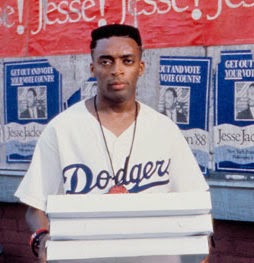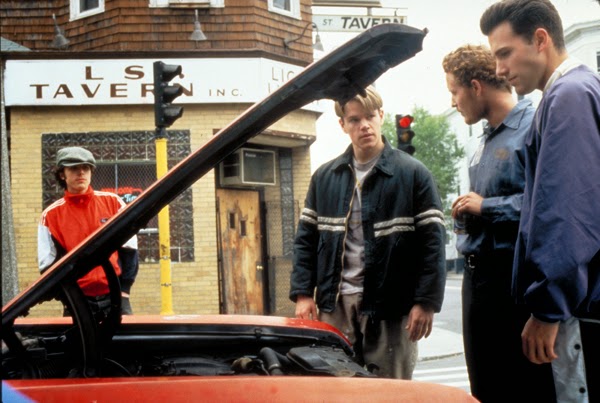 |
| from Kal Ho Naa Ho |
I even played clips of Bert and I for my classmates to make sure they knew the difference between a Maine accent and a Southie slur. (It didn't help, as everyone insisted on reading my scripts like they were set in Dorchester and everyone was Mark Wahlberg.)
Finally, I did all of this research, I figured out how to portray the language as realistically as I could, and I even added in a glossary of non-standard vocabulary - although I felt comfortable that it was all clear in context. And you know what happened?
No one understood it. Or rather, no one bothered to understand it. The biggest note that I got was that the regionalization of the language, especially as written into the dialogue, was confusing and off-putting. Instead of writing accents in, I should just write in the notes that the characters were speaking with a Maine accent and leave it at that. Write it all as standard English, and let people use their imaginations.
I would have been fine with that advice, if only the previous four months hadn't taught me abundantly well that no one on the West coast knows what a Maine accent is, and that everyone would just figure that New England = Southie. And for some reason, the idea of having my script, an ode to the difficulties of life in rural Maine and to family and scraping by and what it's like to live in a fishing town without any fish, stripped of its linguistic authenticity drove me a little nuts. But I wanted someone to read my script, so I "fixed it."
I regret that now.
 |
| from Good Will Hunting |
Have you ever heard an American say that they just love "the British accent"? I can almost guarantee that you have, probably uttered at a high pitched squeal, or a soft purr, and generally with some reference to hot guys or girls or both. That's cool. Attractive people are attractive, after all. But the problem with that is that there really is no such thing as the "British" accent. There are, instead, hundreds of accents all throughout the British Isles, each one distinctive and culturally rooted. What we think of as the "British accent" is usually one specific kind of accent, and that is the BBC newscaster accent. Or, the OxBridge high educated upper class accent. Stephen Fry and Emma Thompson and dry humor.
That accent, for all that it is popular and well known, however, is no more the official British accent than United States newscaster blandness is the official American accent. It is simply more standardized, and therefore better known.
And that's fine. It makes sense that over time one accent would rise to prominence and become better known. It works as a sort of linguistic shorthand for communication, bridging the gaps between different regional dialects, and ensuring that everyone receives the same information. It only becomes problematic when we take this standardization out of context. When we think of this more standard form as the "right" accent or way to speak. When we assume that anyone who does not speak this way is ignorant or poor.
That is complete and utter crap. Just because I literally cannot say the words "room" and "broom" without a Boston accent does not make me uneducated, nor would I somehow magically lose my degrees if my Boston accent were as strong and thick in normal life as it is when I'm at a Red Sox game. I would, however, be judged differently, as a Boston - Southie - accent is considered lower class and poor, while my general standard tones are signifiers that I went to college and graduate school, and that I come from a middle-class family. There are value judgments associated with the way I talk.
 |
| from Do The Right Thing |
Again, that's complete and total crap. If we went by the numbers, the proper accent for the English language would actually be based on a typical East-Chinese Mandarin accent, since that's where the most English speakers are. Seriously.
I bring all of this up because a few days ago, a friend of mine sent me a link with good intentions. He wanted to make me laugh. Unfortunately, I wasn't in a very happy mood, and I may have given him both barrels of my opinion. The link in question was to Weird Al's latest parody, "Word Crimes", which mocks Robin Thicke's "Blurred Lines". It's very funny, and very clever.
The video really is funny, right? You can say yes, I won't bite you. I laughed a little, and I definitely think it's better than the original song by far. The issue I have with this video is more based in the assumptions that surround it. Basically, this is a song about how lots of people make grammatical errors, and that they should be educated so they stop doing it, and we should all mock them for being dumb.
No. To all of that.
First off, the video is based on the faulty premise that there is such a thing as a correct grammar. There isn't. Everything we know of "correct" grammar is something that people just made up. In our case, American English, it was standardized in the late 1700s so that Revolutionary fighters could make and distribute propaganda and reach the widest audience possible. Up until that point, there really wasn't a standard form of English, because there didn't need to be. If most of your talking is done face to face, then who cares that you speak something a little idiosyncratic? No one, that's who.
So there really isn't a correct English, there's just an English that we consider to be more correct or "educated". Some people call this Academic English. That works fine. And Academic English does serve a purpose in our culture - it acts as a bridge between different cultural communities and fosters communication. Yay!
But I reject out of hand the idea that not knowing or caring about Academic English makes one stupid. I also reject the idea that choosing to ignore standardized grammatical forms is a sign that you're uneducated. And I realize that this is all a bit funky coming from someone who is clearly fluent at writing in Academic English, but hey. My point still stands. At the end of the day, who the crap cares what someone else writes grammatically in a text message or status post? Chances are, even if the English was "mangled", you understood it. So why do you care?
 |
| from Good Will Hunting |
I say this as someone whose literal job, for years now, has been to "correct" other people's grammar. I do freelance editing, and I used to work as an "Accent Reduction Specialist", training people to "lose" their native accents and "gain" the American accent. Except the part where there is no correct accent, and who really cares? I wasn't very good at that job. I may have been fired for ideological reasons. (Whoops.)
The point is, I reject out of hand the idea that because someone is speaking non-standard English, they are inherently worth less than someone else. And I feel like more people would agree with me, if only we had the chance to really see characters with non-standard accents in mainstream media. Sure, you've got your Darryl Dixons and your Marky Marks, your Sookie Stackhouses and your Woody Allens. But more often than not, those characters are tokens and linguistic talismans. There's maybe one of them in the movie, and they are best known for their accent.
Rarely do we see whole movies done in the culture and accent of a subgroup. Especially one with a distinctive grammar. I mean, you've got Good Will Hunting and The Town and Gone Baby Gone and The Departed representing Boston. You've got American Hustle and The Sopranos for New Jersey. Probably lots of stuff for New York City. But what about a movie set in Cuban Miami? Or Puerto Rican New York City? Or Indian Seattle?
I know why they don't get made right now. Media executives have little confidence that we, the audience, would watch them. After all, aren't movies with a distinctively African-American dialect "urban" and "low-brow" and "uncomfortable" for white audiences? Aren't movies where the main character is not a native English speaker kind of risky for the studio? Don't all movies and shows need to appeal to the most people in the most ways?
 |
| from Do The Right Thing |
The reason I'm not talking about any particular movie or show in this article should, by now, be apparent to you. What I'm really focused on here is not a movie or show, but a lack of mainstream media that represents the real linguistic reality of our world. Yes, it's important for media to be able to communicate. But it's also important for media to act as an ambassador from one culture to another, even within the same language. It's vital that we stop seeing people who speak differently from the standard as "bad" or "stupid". They're people. Their way of speaking is just as valid as ours.
I am distressed by the lack. I am upset over how many movies I haven't seen that might have changed my life, but instead were told to change their dialogue because "no one will understand it." When I "fixed" my script, something was lost. It wasn't true anymore, somehow. I gave in and I accepted the lie that there is such a thing as normal, and that different is bad. I regret that now, and I want to make sure no one else does the same thing I did.
And, for the record, I am still annoyed by how many people think Boston and Maine are exactly the same thing.
 |
| This still is from Kal Ho Naa Ho, a Bollywood made movie set in New York and performed partially in English. Now tell me again how your English is the only real English? |

I suspect, deep down, everyone feels this way. My accent is a definable characteristic that many, many people comment on (it is a bit odd, being a combination of my origins and the place I've now lived for 8 years or so, with a little Massachusetts slang thrown in for good measure). Attacking the way someone talks is akin to attacking their identity.
ReplyDeleteWell said. I think that how we speak is a huge part of our identities. It's how we express our inner life to the outer world. And being misunderstood? Awful.
DeleteLearning how to talk good and it is all about social class about which we define here. If you want to define everything then means whole for the learing material is here with an best essays. And if you want to understand then it is really important ever.
ReplyDeleteCALL GIRLS SERVICE KOLKATA
ReplyDeleteCALL GIRLS IN KOLKATA
KOLKATA CALL GIRLS
KOLKATA CALL GIRLS
CALL GIRLS KOLKATA
CALLL GIRL kolkata
FEMALE CALL GIRLS KOLKATA
FEMALE CALL GIRLS
SEXY CALL GIRLS SERVICE IN KOLKATA
ESCORTS SERVICE IN KOLKATA
KOLKATA FEMALE ESCORT SERVICE
TOP ESCORTS SERVICE KOLKATA
BEST KOLKATA ESCORTS SERVICE
CALL GIRLS SERVICE
ESCORTS SERVICE
ESCORT SERVICE
ESCORTS SERVICE IN KOLKATA
BENGOLI ESCORTS GIRLS
BENGOLI CALL GIRLS KOLKATA
KOLKATA ESCORTS SERVICE
FREE ESCORTS SERVICE KOLKATA
FREE WHATSAAP NUMBER ESCORTS
FREE WHATSAAP NUMBER OF CALL GIRLS
PHONE NUMBER OF ESCORTS SERVICE
FREE PHONE NUMBER ESCORTS SERVICE
MOBILE NUMBER OF ESCORTS SERVICE